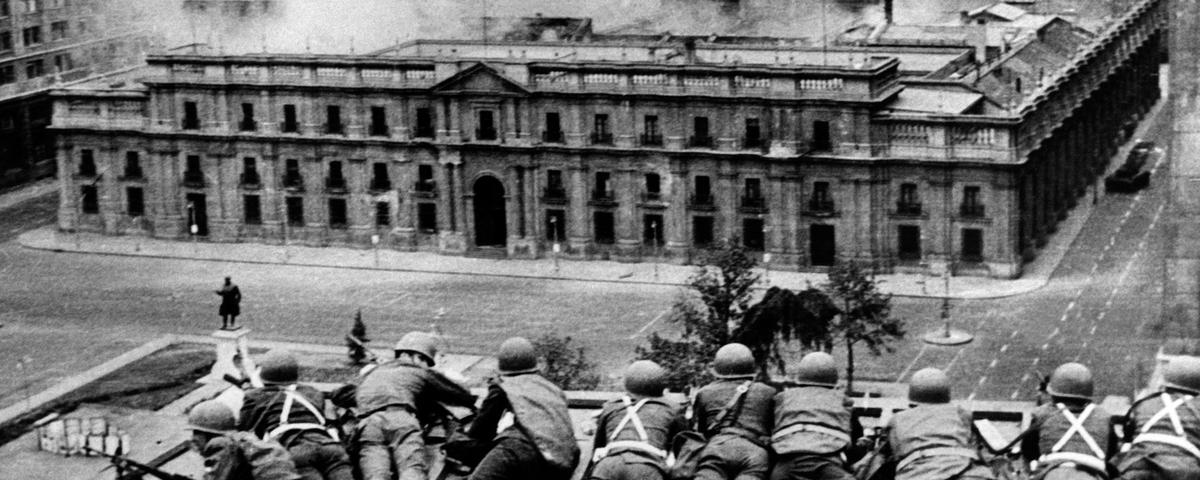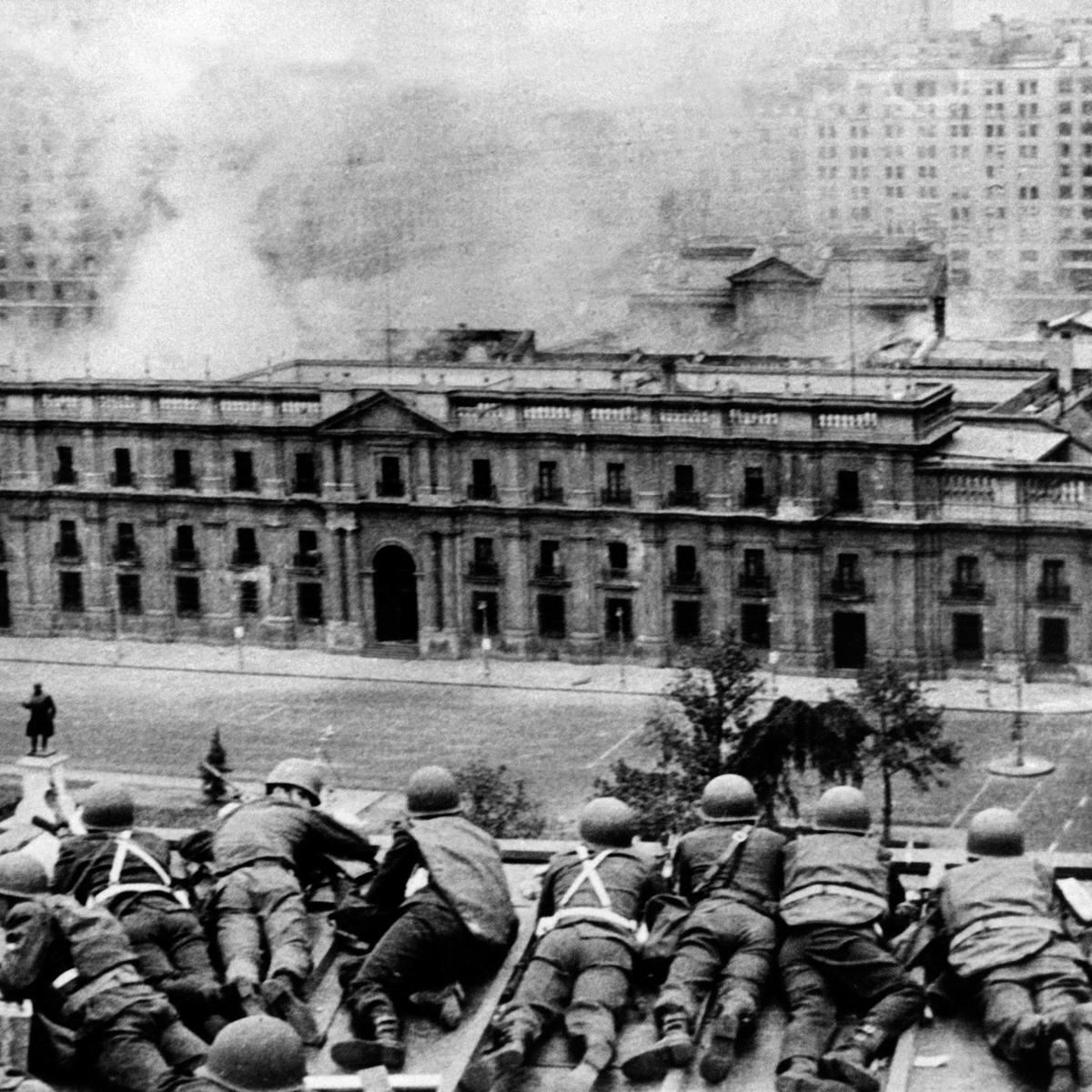I rewind my skin and retina to try to catch a glimpse of the young woman I was at 22. I had two very young daughters whom I loved madly, while my partner and I were building a family that embraced many friends with whom we were trying to push back the horizon. We were part of a generation that, for the first time, felt it could touch the sky and change the face of poverty in our country. Salvador Allende, a doctor and socialist leader, had achieved an unprecedented milestone: a left-wing government elected by popular vote —the peaceful way— and announced an Agrarian Reform and the nationalization of the copper mines owned by three transnational corporations.
I was a journalist for the newspaper El Siglo, part of a team of talented and committed individuals who relentlessly sought to expose those who, from the shadows, organized and financed strikes by transport workers and doctors and hoarded flour, milk, chicken, and other basic foodstuffs to exacerbate the anger of the population. With terrorist attacks on oil pipelines, railways, and even attempts to blow up the capital’s airport, they spread fear.
But that did not paralyze us. We felt part of a river that, through hard work, love, and song, could stop the coup plotters. How can we forget those songs that invited us to join that river bubbling with life? So far from a trench filled with millions of crushed dreams.
It was not to be. The bombs that destroyed the presidential palace on September 11, 1973, where President Allende had spoken to us for the last time, asking us not to let ourselves be massacred, would split my life in two. I was left in the open: without a home (it was raided and looted); without a job, occupied by the military and some of my colleagues taken prisoner. Without a roof, without a floor, without walls, with fear trying to permeate every crack in my body. Naked in the public square... But I had two young daughters to feed and protect.
The resistance began immediately. The urgent task was to collect the names of men and women killed in those first months of dictatorship; to identify those who were dragged to secret prisons; to locate precisely those clandestine jails where torture was carried out with a cruelty we had never known. And the hardest part: to search for those who seemed to have been swallowed up by the earth. The word “disappeared” was not uttered. We did not know that we would have to search for their bodies in the desert, rivers, mountains, and sea for many years. That we would continue searching...
Saving lives. And in that task, one day I found myself receiving an instruction. I had to leave. I did not want to. But that is how I ended up in Paris, a destination I did not choose. I was caught up in the whirlwind of events. Organizing my life to continue trying to save lives was a priority. Every day we heard new names of colleagues who had been murdered, of those who were crammed into concentration camps in inhumane conditions. The list swelled of those whom the regime of Augusto Pinochet said “are lying! They were never detained”; “they crossed the mountains to Argentina to form a guerrilla group and attack us.”
Only the faces and laughter of my daughters reminded me every morning, when I took them to kindergarten, that life went on...
To earn a living, I worked as a laborer in the printing office of the municipality of Sarcelles, north of Paris. In that place where I was imbued with solidarity, I turned to the songs that had nourished me so many times to pull out from between the rollers of the imposing offset presses that printed up to five colors, which my colleagues with expert hands taught me to operate. At the end of the day came the hard part: We had to dismantle and clean each piece and leave it spotless for the next day.
One afternoon, the little boy beating inside me could not take it anymore and slipped between my legs in thousands of red drops. I tried to hold him with my hands. I spoke to him. I asked him for forgiveness. I cradled him. It was too late. I could not tell him that I loved him, that this was just a nightmare, that soon his sisters would be back playing with Danilo and Diego at the Bambi Garden. That child has no grave. That night I knew I was an exile.
Seen from El Salvador, Trump’s Heroes Lose Their Luster
When I returned to the street, I knew that being exiled in my case did not mean searching in vain for the Andes mountains. The truth was that I felt like a cat whose whiskers had been cut off; when I got on the subway, I strained to decipher without any success the faces of joy or fear of the people. Nor could I read in their eyes that something had happened that morning or the night before. I was a stranger to the sounds just around the corners of the city that change with the rhythm of daily movements. That is what ties me to the city where I live, dream, and love: I breathe its pulse in my retina, in my pores, and in my nostrils. Now there was fear: fear of losing, in that endless exile, the sense of urgency, that compass embedded in your veins... The loss of a child shakes you, rocks you.
It was a change — a radical shift. From that moment on, I took advantage of every moment with my daughters to tell them story after story about their country, about our heritage and our people, about our rivers and forests. Stories about María, that poor, mischievous girl who always knew how to laugh. About what my father taught me. About the soccer I love and the songs that move me. And I searched hard at fairs and markets for basil, cilantro, Chilean avocados, and pomegranate beans to recreate the smells of home in my kitchen and welcome those who arrived from the horror in Chile. Or those who felt the bite of exile. I learned that cooking among exiles, with everyone chopping something to go into the pot, is the best collective therapy for chewing through pain. And that savoring what we cook together brings out the music inside us.
Dozens of men and women passed through that kitchen and, under the spell of the aroma of Chilean home cooking, were finally able to expel episodes that had become ingrained in them. Like my son in that cold basement in Sarcelles. And so a record for history was pieced together.
I became an expert in mental archives. And from there, it was only a short step to the paper archive. The death machine had to be dissected. If we wanted to prevent it from being restarted, we had to detect in time when it was being oiled, who was designing it, recruiting its operators and agents of state terrorism. Most importantly: who was financing it.
That is how I got back into the practice of building and maintaining an archive, which I had learned from my first journalism teacher at the University of Chile: the great war correspondent Mario Planet. I was ashamed to realize that I had never grasped the importance of well-stocked archives for mapping corruption, looters, authoritarians, and, of course, murderers. To track where and how they have sophisticated their techniques of torture and “softening.” The manual they follow to break you, to subdue you. There in Paris, I had great teachers who had been through Nazi prisons and taught me that the first thing is to know my weaknesses and fears, to chew them over and accept them. To resist.
I read every moment of the day that a window of opportunity was opening. And almost always at night. Stealing sleep. But there was urgency. And when I read Gilles Perrault’s “The Red Orchestra” and met its protagonist, I knew I was ready to return. I had been caught up in a passion for investigative journalism. That was what had to be done: dissect the unchecked corruption of the main figures of the dictatorship, starting with Pinochet. I confess that I did not imagine that years later I would discover how corrupt he was.
It was the end of 1978, and the dictatorship was still murdering and disappearing people. I had a treasure: a fledgling archive. I thought I was no longer a journalist. How wrong I was. I would find out four years later. But during those years, the archive grew. Always organized. It has been my shell. There are unique documents there. Yes, I confess that I stole them. But if I had not, they would have been burned or made to disappear, like many of my friends. It is the record of a massacre. Of dispossession.
Kissinger’s “Benign Neglect” Approach in El Salvador
It amazes me today to remember what triggered me when I found out I was “exiled.” Of course, I also confess that there are some miserable aspects to it. Like refusing to visit the Louvre for many years or enjoy a few hours of relaxation at the Galeries Lafayette or on the banks of the Seine.
I proclaim with a certain pride that I am part of that generation of journalists who learned to do the best investigative journalism, with rigor, truthfulness, the faces and voices of the perpetrators, and torture-proof, in exile and under repression in Chile. We naïvely said that if they lied, we would “shoot” with the truth: our best weapon. We could not lie. Strange, is it not? Wanting to prove to corrupt and authoritarian people that they lie; that they can imprison, persecute, harass, and even kill some of us, but we will not lie. How arrogant our moral attitude was: They lie, we tell the truth. And another proclamation: Either you are against the dictatorship or you are not a journalist, but an accomplice.
Of course, that arrogance is never accompanied by ostentation about what you do. And I think that is the crux of what I learned: You are not Batman or Superwoman, not the Lone Ranger or Wonder Woman; you are a link in a chain of people who risk a great deal to deliver a piece of information, a document. You are at the end of the chain, and you shape history. Why? So that no public figure or authority has room to say, “No, I didn’t know.” To write history and hasten the shift toward freedom. To shorten the suffering of so many who are searching for their loved ones. So that we allow them to fulfill the ancestral rite of burying their dead. So that tomorrow it will not be difficult to recover what was stolen. It will all have been documented.
Over the last twenty years, I have had the privilege of feeling and savoring the ethical imprint and seal of Gabriel García Márquez as a mark burned into at least three generations of Latin American journalists. In that school, I have learned humility, courage, and intelligence from the best. Many exiled journalists have passed through the foundation he created with Jaime Abello. He taught us to be artisans in the face of adversity: weavers of networks. Today, it is a great privilege to be part of what we call “the mafia of the good.”
Mónica González, a Chilean journalist exiled during the Pinochet dictatorship, is president of the Governing Council of the Gabo Foundation.

